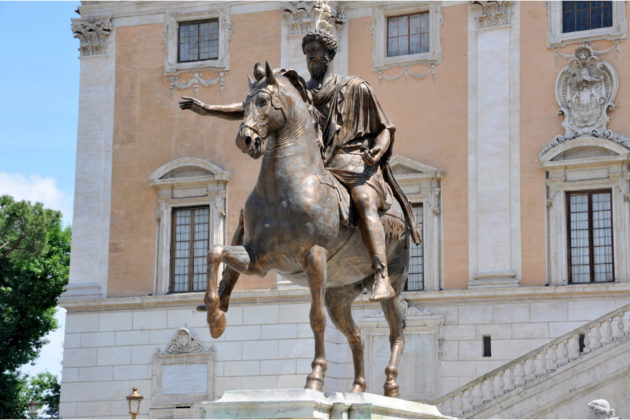What can ancient philosophers teach us about wellbeing?
As busy communicators working under constant pressure, I believe we can learn a lot of practical wisdom from ancient sages. In this blog I will talk about 3 giants of ancient philosophy, Pyrrho, Aurelius and Epicurus, and what they can tell us about achieving good mental health.

There is an astonishing anecdote about Pyrrho of Elis (360-270 BCE), known as the father of Scepticism, who was travelling by sea when a terrifying storm struck. The crew was absolutely horrified and tried to hide under the deck but Pyrrho remained serene and calm. The companions were flabbergasted and asked him why he behaved that way? The thinker pointed out to a pig who was some eating food, blissfully ignorant of any dangers around it.
What can we learn from this? Well, the pig had in fact more control over the whole situation than the rest. It did not worry or run with panic around the ship but simply carried on business as usual. You may say that this story is a bit exaggerated as we’re not pigs, but there is definitely something we can learn from the Sceptics here.
We should not treat ourselves so seriously and take time to critically evaluate what is really important in our lives. More importantly, as Pyrrho says, we should let go of judgements about the world and other people. By suspending our judgements and preconceptions, we will be more open-minded towards other ideas. By accepting things we cannot control, we will become free from fear.
This can be summarised by the concept of “ataraxia” which is sadly quite lost to the modern world. The term can be translated as “a state of mind which is free from distress” or “not being disturbed”. It’s worth pointing out that for all the major schools of ancient philosophy – Stoicism, Epicureanism, Cynicism, and aforementioned Scepticism – achieving “ataraxia” was a common goal for life, even though these schools positioned it in slightly different ways.
Not many ancient books became such bestsellers as “Meditations” by Marcus Aurelius, a Roman emperor between 161 and 180 CE. I honestly think he is a canonical author for all leaders who want to learn how to deal with adversity. His emperorship was marked with constant wars and he spent most of his life fighting on the fragile borders of the Empire.
“Meditations” contain some brilliant advice on how to have a simpler and happier life. By the way, it’s somehow ironic this is coming from the most powerful man of that time! I’d like to share the following advice from Marcus:
“Always make a sketch or plan of whatever presents itself to your mind, so as to see what sort of thing it is when stripped down to its essence, (…) For nothing is as effective in creating greatness of mind as being able to examine methodically and truthfully everything that presents itself in life.” (Meditations 3.11)
What I’m sure all communicators lack is time, particularly for self-reflection. Marcus Aurelius points out that happiness is something we need to find in ourselves and it really depends on the quality of our thoughts. To put it bluntly, if we’re thoughtlessly chasing our tails, we will never be happy.
I sometimes catch myself rushing through tasks wanting to deliver at pace but actually spending not enough time on thinking about “the essence”, the strategic objective, and examining the purpose of all comms work I’m doing.
Working through details, working conscientiously, working persistently and – using the Stoic language – without too much complaining, we will be able to achieve great things, even if they seem small.
Our last sage is Epicurus (341–270 BCE), the father of – you guessed it – Epicureanism; a very controversial school of thought at the time due to its argued atheism and the rejection of conventional morality.
Epicurus is still misunderstood as the proponent of uncontrolled hedonism. What he actually meant was the opposite – achieving happiness through moderation. He argues that overindulgence leads us to pain in the long-term. Even though it may be pleasurable for a short time, once the object of pleasure is gone, it leaves us feeling deprived.
We can seek and find happiness in an afternoon walk
We should strive to find contentment with small pleasures instead. Epicurus would usually eat simply (bread, olives and cheese were on his daily menu), reserving luxurious food only for special occasions. I think this very much resonates with the times of the global pandemic. We are all locked down at home as other “more” pleasurable things, such as holidays abroad or going out with friends, have been absent for a while.
We can seek and find happiness in an afternoon walk, talking to a friend on the phone, or playing chess online. I believe that, even though this time is very challenging, it can teach us to appreciate things and people more because we realise how fragile everything is.
You can learn more about these thinkers by reading the below:
- Psychology Today – What Is Ataraxia?
- The Guardian – Stoicism in a time of pandemic: how Marcus Aurelius can help
- Big Think – The happiness contradiction: Essential ways to find value in life from Epicurus
- Image credit:
- Michal Ratynski (1)
